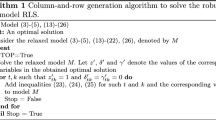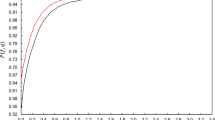Abstract
Robust multi-stage linear optimization is hard computationally and only small problems can be solved exactly. Hence, robust multi-stage linear problems are typically addressed heuristically through decision rules, which provide upper bounds for the optimal solution costs of the problems. We investigate in this paper lower bounds inspired by the perfect information relaxation used in stochastic programming. Specifically, we study the uncapacitated robust lot-sizing problem, showing that different versions of the problem become tractable whenever the non-anticipativity constraints are relaxed. Hence, we can solve the resulting problem efficiently, obtaining a lower bound for the optimal solution cost of the original problem. We compare numerically the solution time and the quality of the new lower bound with the dual affine decision rules that have been proposed by Kuhn et al. (Math Program 130:177–209, 2011).









Similar content being viewed by others
References
Agra, A., Christiansen, M., Figueiredo, R. M. V., Hvattum, L. M., Poss, M., & Requejo, C. (2013). The robust vehicle routing problem with time windows. Computers & OR, 40(3), 856–866. https://doi.org/10.1016/j.cor.2012.10.002.
Agra, A., Santos, M. C., Nace, D., & Poss, M. (2016). A dynamic programming approach for a class of robust optimization problems. SIAM Journal on Optimization, 26(3), 1799–1823.
Avriel, M., & Williams, A. (1970). The value of information and stochastic programming. Operations Research, 18(5), 947–954.
Ayoub, J., & Poss, M. (2016). Decomposition for adjustable robust linear optimization subject to uncertainty polytope. Computational Management Science, 13(2), 219–239.
Baumann, F., Buchheim, C., & Ilyina, A. (2014). Lagrangean decomposition for mean-variance combinatorial optimization. In Combinatorial optimization—third international symposium, ISCO 2014, Lisbon, Portugal, March 5–7, 2014. Revised Selected Papers (pp. 62–74).
Ben-Tal, A., Golany, B., Nemirovski, A., & Vial, J.-P. (2005). Retailer-supplier flexible commitments contracts: A robust optimization approach. Manufacturing & Service Operations Management, 7(3), 248–271.
Ben-Tal, A., Goryashko, A., Guslitzer, E., & Nemirovski, A. (2004). Adjustable robust solutions of uncertain linear programs. Mathematical Programming, 99(2), 351–376.
Ben-Tal, A., & Nemirovski, A. (1998). Robust convex optimization. Mathematics of Operations Research, 23(4), 769–805.
Ben-Tal, A., & Nemirovski, A. (2000). Robust solutions of linear programming problems contaminated with uncertain data. Mathematical Programming, 88(3), 411–424. https://doi.org/10.1007/PL00011380.
Bertsimas, D., & Dunning, I. (2014). Multistage robust mixed integer optimization with adaptive partitions. Operations Research, 64, 980–998.
Bertsimas, D., & Georghiou, A. (2015). Design of near optimal decision rules in multistage adaptive mixed-integer optimization. Operations Research, 63(3), 610–627. https://doi.org/10.1287/opre.2015.1365.
Bertsimas, D., & Sim, M. (2003). Robust discrete optimization and network flows. Mathematical Programming, 98(1), 49–71. https://doi.org/10.1007/s10107-003-0396-4.
Bertsimas, D., & Sim, M. (2004). The price of robustness. Operations Research, 52(1), 35–53.
Bertsimas, D., & Thiele, A. (2006). A robust optimization approach to inventory theory. Operations Research, 54(1), 150–168.
Bienstock, D., & Özbay, N. (2008). Computing robust basestock levels. Discrete Optimization, 5(2), 389–414. (in Memory of George B. Dantzig).
Billionnet, A., Costa, M., & Poirion, P. (2014). 2-Stage robust MILP with continuous recourse variables. Discrete Applied Mathematics, 170, 21–32.
Birge, J. R., & Louveaux, F. (2011). Introduction to stochastic programming. Berlin: Springer.
Bougeret, M., Pessoa, A., & Poss, M. (2016). Robust scheduling with budgeted uncertainty. Discrete Applied Mathematics Conditionally. https://hal.archives-ouvertes.fr/hal-01345283/document.
Chen, X., & Zhang, Y. (2009). Uncertain linear programs: Extended affinely adjustable robust counterparts. Operations Research, 57(6), 1469–1482.
de Ruiter, F. J. C. T., Ben-Tal, A., Brekelmans, R., & den Hertog, D. (2017). Robust optimization of uncertain multistage inventory systems with inexact data in decision rules. Computational Management Science, 14(1), 45–66. https://doi.org/10.1007/s10287-016-0253-6.
Garey, M. R., & Johnson, D. S. (2002). Computers and intractability (Vol. 29). New York: W. H. Freeman.
Goh, J., & Sim, M. (2010). Distributionally robust optimization and its tractable approximations. Operations Research, 58(4–part–1), 902–917.
Gorissen, B. L., & den Hertog, D. (2013). Robust counterparts of inequalities containing sums of maxima of linear functions. European Journal of Operational Research, 227(1), 30–43.
Huang, C. C., & Vertinsky, W. T. Z. I. (1977). Sharp bounds on the value of perfect information. Operations Research, 25(1), 128–139.
Kouvelis, P., & Yu, G. (2013). Robust discrete optimization and its applications (Vol. 14). Berlin: Springer.
Kuhn, D., Wiesemann, W., & Georghiou, A. (2011). Primal and dual linear decision rules in stochastic and robust optimization. Mathematical Programming, 130, 177–209.
Oostenbrink, J. B., Al, M. J., Oppe, M., & Rutten-van Mölken, M. P. (2008). Expected value of perfect information: An empirical example of reducing decision uncertainty by conducting additional research. Value in Health, 11(7), 1070–1080.
Pochet, Y., & Wolsey, L. A. (1994). Polyhedra for lot-sizing with wagner-whitin costs. Mathematical Programming, 67, 297–323. https://doi.org/10.1007/BF01582225.
Pochet, Y., & Wolsey, L. (2013). Production planning by mixed integer programming. Berlin: Springer.
Poss, M. (2013). Robust combinatorial optimization with variable budgeted uncertainty. 4OR, 11(1), 75–92. https://doi.org/10.1007/s10288-012-0217-9.
Postek, K., & den Hertog, D. (2016). Multistage adjustable robust mixed-integer optimization via iterative splitting of the uncertainty set. INFORMS Journal on Computing, 28(3), 553–574. https://doi.org/10.1287/ijoc.2016.0696.
Zeng, B., & Zhao, L. (2013). Solving two-stage robust optimization problems by a constraint-and-column generation method. Operations Research Letters, 41(5), 457–461.
Author information
Authors and Affiliations
Corresponding author
Appendices
Reformulation of affine decision rules
Plugging (14)–(16) into \(\mathcal {P}\) and enforcing that y does not depend on \(\xi \), we obtain the formulation below.

Although the number of variables in the problem described above is polynomial, we still have to deal with an infinite number of constraints. As said already, one easily sees that we can restrict ourselves to the extreme points of \(\varXi \); yet, this typically leads to an exponential number of constraints. An alternative and more compact approach applies classical tools from robust optimization to reformulate each robust constraint as a polynomial number of deterministic constraints plus a polynomial number of additional real variables, see Ben-Tal and Nemirovski (2000). We skip the details of that approach and provide below the resulting MILP.

We can obtain similarly the formulation for the problem without setup by removing the variable y from the above formulation.
Reformulation of dual affine decision rules
In this appendix, we sketch how to obtain a MILP reformulation for the lower bound of the robust lot-sizing following the method presented in Kuhn et al. (2011). The method requires to introduce an artificial probability measure with our uncertainty set \(\varXi \). To keep the presentation simple, we will exemplify the framework from Kuhn et al. (2011) with the discrete probability measure \(\mathbb {P} (\xi )\) defined over the set of extreme points of \(\varXi \). Hence, \(\mathbb {P} \) is any vector in \(\mathbb {R}_+^{\vert {{\mathrm{ext}}}(\varXi )\vert }\) that satisfies
The first step of the approach of Kuhn et al. (2011) relaxes the robust constraints to expectation constraints as follows.

where \(\psi \) and \(\theta \) are additional slack variables. One readily verifies that, for any probability distribution \(\mathbb {P} (\xi )\), the above problem provides a lower bound for the optimal solution of problem \(\mathcal {PI}_{1} \).
Then, using advanced dualization techniques inspired by the dualization used in classical robust optimization, the authors of Kuhn et al. (2011) are able to reformulate the above lower bound as the following mixed-integer linear program, where matrix \(\mathcal M\) is defined as \(\mathcal {M} = \mathbb {E} (\xi \xi ^{T})\), \(\mathcal W\) is the matrix defined as \(\mathcal {W} = (W - qe^{T}_{1})\mathcal {M}\), and \(e_{1}\) is the vector with all entries equals to one. Specifically, the following mixed-integer linear program is obtained by applying reformulation (4.6) from Kuhn et al. (2011) to \(\mathcal {PI}_{1} \).

We can obtain similarly the formulation for the problem without setup by removing the vriable y from the above formulation.
Proof of Lemma 2
Let us detail the inner maximization of (26) as

By definition, \(\beta _{kl}\ge 0\) for each \(k\in K,l\in L(k)\), so that we can relax constraints (34) to \(\xi \ge 0\) without affecting the optimal solution. Thanks to the strong duality in linear programming, the optimal solution cost of the above problem is equal to the optimal solution cost of its dual, given by
Substituting \(\varphi _k\) by \(\max (0,\sum _{l\in L(k)} \beta _{kl} z_{l}-\theta )\) for each \(k\in K\), we can further reformulate (26) as
The crucial step of our proof (which differs from Theorem 3 from Bertsimas and Sim (2003)) is that, because the constraint \(\sum _{l\in L(k)}z_l=1\) holds for each \(k\in K\), we can further reformulate (35) as
The rest of the proof is identical to the proof of Theorem 3 from Bertsimas and Sim (2003).
Rights and permissions
About this article
Cite this article
Santos, M.C., Poss, M. & Nace, D. A perfect information lower bound for robust lot-sizing problems. Ann Oper Res 271, 887–913 (2018). https://doi.org/10.1007/s10479-018-2908-x
Published:
Issue Date:
DOI: https://doi.org/10.1007/s10479-018-2908-x




